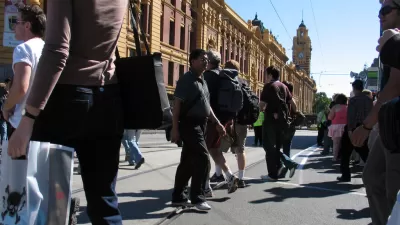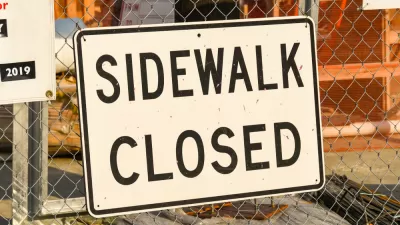A post on Ars Technica digs into the complicated world of pedestrian modeling and identifies a culprit in the problems with existing models: indecisive people.

Chris Lee introduces the research of Alessandro Corbetta, from the Technical University of Eindhoven, into the difficulties of creating reliable models for pedestrian behavior.
The problem:
Unfortunately, pedestrian models are not very well tested against data. Most experiments involve paying university students to walk along corridors and through doors under highly artificial conditions. In part, this is because it has been very difficult to obtain data from natural settings, where you need to track individual pedestrians as they walk through some area of interest.
The solution:
Corbetta set [Kinect] cameras up in two locations: the main thoroughfare at Eindhoven train station and a link corridor between one of the university buildings and the nearest cafeteria. From there, he recorded data for a year.
Corbetta's findings after crunching the quarter of a million trajectories he discovered during the experiment revealed some of the behavior that makes pedestrian modeling so difficult. Namely, that some people change their minds en route, and turn around. The article goes into more detail about how Corbetta accounted for their indecision for the ongoing project of building reliable pedestrian models.
FULL STORY: Models of pedestrian flow stumble because people change their minds

Alabama: Trump Terminates Settlements for Black Communities Harmed By Raw Sewage
Trump deemed the landmark civil rights agreement “illegal DEI and environmental justice policy.”

Study: Maui’s Plan to Convert Vacation Rentals to Long-Term Housing Could Cause Nearly $1 Billion Economic Loss
The plan would reduce visitor accommodation by 25% resulting in 1,900 jobs lost.

Planetizen Federal Action Tracker
A weekly monitor of how Trump’s orders and actions are impacting planners and planning in America.

Waymo Gets Permission to Map SF’s Market Street
If allowed to operate on the traffic-restricted street, Waymo’s autonomous taxis would have a leg up over ride-hailing competitors — and counter the city’s efforts to grow bike and pedestrian on the thoroughfare.

Parklet Symposium Highlights the Success of Shared Spaces
Parklets got a boost during the Covid-19 pandemic, when the concept was translated to outdoor dining programs that offered restaurants a lifeline during the shutdown.

Federal Homelessness Agency Places Entire Staff on Leave
The U.S. Interagency Council on Homelessness is the only federal agency dedicated to preventing and ending homelessness.
Urban Design for Planners 1: Software Tools
This six-course series explores essential urban design concepts using open source software and equips planners with the tools they need to participate fully in the urban design process.
Planning for Universal Design
Learn the tools for implementing Universal Design in planning regulations.
Caltrans
Smith Gee Studio
Institute for Housing and Urban Development Studies (IHS)
City of Grandview
Harvard GSD Executive Education
Toledo-Lucas County Plan Commissions
Salt Lake City
NYU Wagner Graduate School of Public Service





























